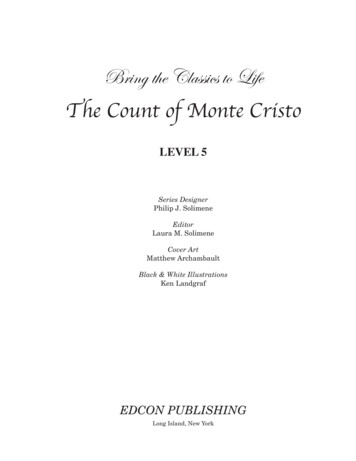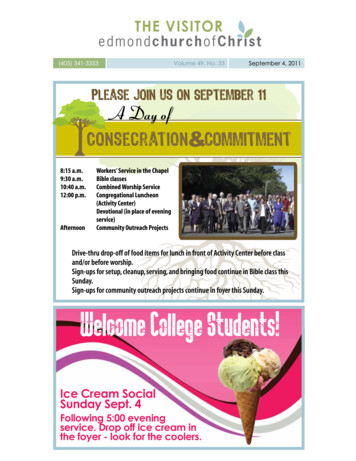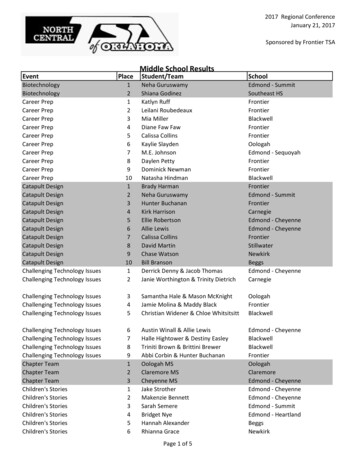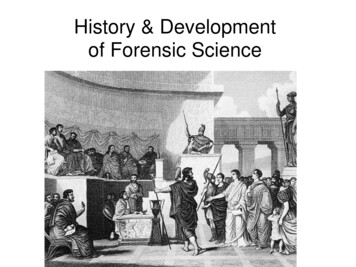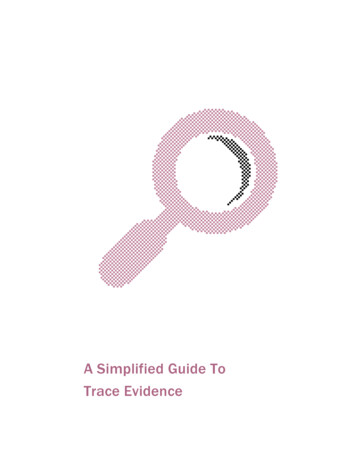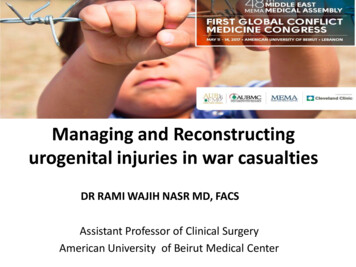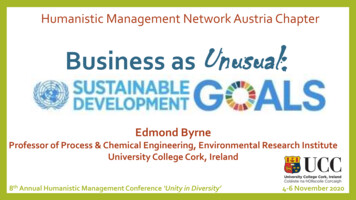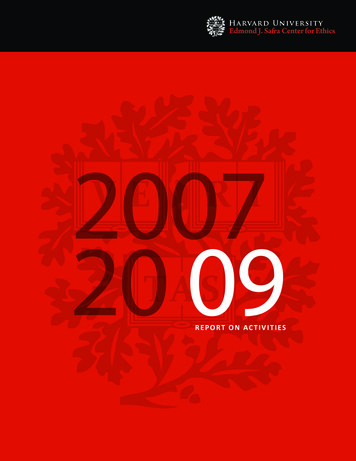
Transcription
200720 09REPORT ON ACTIVITIES
2007-09 REPORT ON ACTIVITIES4Report of the Acting Director, Arthur Applbaum
R E P O R T O F T H E A C T I N G D I R E C TO R A r t h u r A p p l b a u m4EDMOND J. SAFRA CENTER FOR ETHICSREPORT ON ACTIVITIESThe Center did notexpect a two-yearRegency. When ourfounding director,Dennis Thompson,stepped down aftertwenty years ofleadership, I agreedto cover for thedirector-designate,Fred Schauer, whilehe was on leave.When Fred did notreturn to Harvard,my run as acting director was extended. So for twoyears, I have had the pleasure and the luxury of devotingmyself to the stimulating fellowship of both groups offellows, big and little. We like to say that each cohort offellows is at least as good as the preceding ones on atleast one dimension. We especially like to say this whenit is true. The intellectual generosity and collegiality ofthese cohorts truly is unsurpassed, and that has gone along way in making these years memorable for them andfor me.Larry Lessig begins his directorship this month. Larry,who virtually invented the field of cyberlaw, is wellknown at the Center and at Harvard, having been both afellow in ethics and a law professor. Larry brings atransformative vision to the Center, where he will launcha new project devoted to the study of institutionalcorruption. From fresh paint on the walls to new iMacson their desks, the Center staff has prepared a smoothwelcome for an old friend.We have not, however, simply been waiting. I promisedto be an active acting director, and the Center has notstood still in the two years since we celebrated ourtwentieth anniversary. The most visible change is thehandsome new website on which you are reading thisreport. After years of frugal fixes, the time for a majorredesign was overdue. This was supervised with energyand discernment by our office and fellowships coordinator, and now webmaster Stephanie Dant. The history ofthe Center and its current contributions across theUniversity have been captured, our community of alumnifellows, now approaching three hundred, have a forumfor scholarly conversation, and our current activities cannow be publicized in an appealing and accessible way.In response to suggestions by a number of our facultyassociates for a friendly venue at which to present theirwork, the Center initiated the Faculty Workshop inEthics. Most of the sessions have been devoted to theresearch of our junior faculty. A highlight of this serieswas an exchange, carried out over two papers and twoyears, between Joshua Greene, the intrepid neuroscientist, and Selim Berker, his incisive philosophical critic,over what MRI brain scans of experimental subjectssubjected to the trolley problem show.Faculty workshops:2007-2008Mathias Risse, “The Grounds of Justice”Joshua Greene, “The Secret Joke of Kant’s Soul”Eric Nelson, “’For the Land is Mine’: The HebrewCommonwealth and the Rise of Redistribution”Douglas Lavin, “Must There Be Basic Action?”2008-2009Eric Beerbohm, “Nozick’s Wager”Selim Berker, “Can Normative Conclusions Be Wrungfrom Neural Bases?”Martha Minow, “Living Up to Rules: Holding SoldiersResponsible for Abusive Conduct and the Dilemma ofthe Superior Orders Defence”Archon Fung, “The Principle of Affected Interests andInclusion in Democratic Governance”More generally, the Center has been on a mission toexpand the circle of colleagues who consider themselvespart of the Ethics community, reaching out both toyounger professors and to a wider range of departments,from Psychology to Classics. I am happy to report that weare succeeding.Although the Center has not heretofore announcedthemes for our public lectures, patterns have emerged
R E P O R T O F T H E A C T I N G D I R E C TO R A r t h u r A p p l b a u m2007-2008Alan Wertheimer, “Intoxicated Consent to SexualRelations”Richard Holton, “What Does Empirical Research on MoralIntuitions Tell Us about Morality?”Barbara Fried, “Is There a Coherent Alternative toCost-Benefit Analysis?”Ruth Gavison, “Immigration Policy: Sovereignty, Humanitarian Law, or Human Rights?”Josiah Ober, “Democracy and Knowledge: Innovation andLearning in Classical Athens”2008-2009Walter Sinnott-Armstrong,“Neuroscience and Responsibility”Heather Gerken, “Toward aNew Theory of MinorityEmpowerment: Electionsand Governance”Gideon Rosen, “HumanWeakness and the Limits ofResponsibility”Robert Goodin, “GlobalDemocracy: In the Beginning”Alexander McCall Smith, “How to Do Things with Peoplewho Aren’t: The Moral Responsibility of the Author”In keeping with the Center’s mandate to foster collaborative work on normative topics across the University, wehave continued our many partnerships. With our help,my Kennedy School colleague Mathias Risse organizedand hosted a superb conference on “Human Rights andthe New Global Order,” bringing to Harvard an impressive mix of philosophers, legal scholars, and socialscientists. With bothfinancial support andpresentations by a largenumber of facultyassociates, we helpedour undergraduatebioethicists host theannual intercollegiateconference of theNational UndergraduateBioethics Society. Withthe Government Department, we sponsored a memorable exchange between A.J. Julius and G.A. Cohen on“Justice and Constructivism,” followed by a lively debatebetween Jerry and his various comic alter egos.* Ourcollaboration with the Government Department willcontinue next fall with a centennial commemoration ofIsaiah Berlin. We continue to provide a major subventionto Harvard’s Program in Ethics and Health, directed byFaculty Associate and former fellow, Dan Brock.Our dear friend and benefactor, Mrs. Lily Safra, visitedthe graduate fellowship seminar in both years, first onREPORT ON ACTIVITIESPublic lectures:5EDMOND J. SAFRA CENTER FOR ETHICSthat track the evolution of topics in the fellowshipcurricula. There has been a growing interest amongfellows in the intersection of moral responsibilityand neuroscience and in topics concerning globaljustice and human rights, and this has been partlyreflected in the selection of speakers. To everyone’sdelight, the valedictory public lecture this year onthe responsibility of authors to their characters wasgiven by the beloved writer Alexander McCallSmith. Although known to the wider public as theauthor of the best-selling Number 1 Ladies’Detective Agency series, Sandy also is a prominentscholar of medical law and ethics at the Universityof Edinburgh.
R E P O R T O F T H E A C T I N G D I R E C TO R A r t h u r A p p l b a u mthe topic “Deciding for Others” led by Kristi Olson, and then on“Neuroethics” led by Arnon Levy. For one of the lunches, President Drew Faust was our guest. As is our tradition, weconducted our discussions uncompromised by any consideration other than a substantially improved menu and a fewbottles of drinkable wine. Mrs. Safra came splendidly preparedfor my cold-calling.We were especiallyfortunate in the selection ofsenior scholars. Havingreturned to HarvardMedical School after stintsaway as a medical schooldean and universitypresident, the philosopherpsychiatrist Ed Hundertallowed himself to be luredover to the Center last year.Ed’s wry wisdom always enlightened. This year, Elaine Scarry,formally of our English Department but a scholar ofunbounded reach, brought grace and intellectual power to thetable. A discussion she led of moral luck in Hardy’s Mayor ofCasterbridge was one of the year’s highlights. My KennedySchool colleague Frances Kamm, whose ethics get moreintricate every year, once again kept the graduate fellows and me - on our toes. The year was marked by an ongoing,spirited exploration throughout the Center of both the ethicsof torture and the ethics of talking about torture, in partignited by a paper by Frances that we read in a joint fellowshipsession. Frances has graciously agreed to take full charge ofthe graduate fellows this coming year in my stead.These two years saw the success of former fellows, both in theObama Administration and at Harvard. Former graduate fellowSamantha Power, now the Anna Lindh Professor of thePractice of Global Leadership at the Kennedy School, wasappointed Senior Director for Multilateral Affairs in theNational Security Council. Former faculty fellow EzekielEmanuel, chief of bioethics at the National Institutes of Health,has been detailed to the Office of Management and Budget tooversee healthcare reform.Former senior scholarArchon Fung, an authorityon deliberative democracy,has been tenured at theKennedy School and namedFord Foundation Professorof Democracy and Citizenship. I look forward tomanaging moral mischiefwith him for years to come.Another Harvard addition of note, and a personal pleasure forme, is the appointment of Rory Stewart to the directorship ofthe Carr Center for Human Rights Policy and as the RyanFamily Professorship of the Practice of Human Rights. Finally,Martha Minow, a founding member of our faculty committee,who has helped to select every class of faculty fellows with hercharacteristic good sense and wisdom, has been named deanof Harvard Law School.The core of the Center’s activities, of course, has been ourfellowship programs. The faculty and graduate fellow cohortsof the last two years were extraordinary in both range andtalent.2007-2008 Faculty FellowsThe interests of a number of the 2007-2008 Faculty Fellowshad a decidedly international flavor. Eric Gregory, a scholar ofChristian ethics, launched a new project on the lessons of theparable of the Good Samaritan for global justice, and published Politics and the Order of Love: An Augustinian Ethic ofDemocratic Citizenship. Dan Baer, our savvy business andpolitical consultant, returned to his roots in the ethics ofinternational relations and wrote stimulating pieces onsoverign wealth funds and on the responsibilities ofsearch engine developers in their dealings with repressivegovernments. Karen Naimer, our authority on international law, enlightened us with articles holding privatemilitary contractors responsible for their actions, and onrecent developments in the doctrine of universaljurisdiction over war crime prosecutions. Alice Ristroph,our house skeptic, pushed ahead on her book project onthe law of violence, wrote “Professors Strangelove,” acriticism of the legal academy’s apparent indifference to
R E P O R T O F T H E A C T I N G D I R E C TO R A r t h u r A p p l b a u mtorture, and produced a provocative Hobbesian defense of the rightto resist punishment. Recidivist Nien-hê Hsieh (a former graduatefellow), wrote “Does Global Business Have a Responsibility toPromote Democracy?” and continued his work on workplace democracy and the development of a non-Marxist account of labor andexploitation. In another non-Marxist sense of labor,Nien-hê and his wife Sara became the parents ofhonorary fellow, Mika Louise. Ryan Preston, ourmoral theorist, wrote an intriguing paper on havingfaith in humanity and the responsibility of publicfigures not to undermine that faith. He also worriedabout defending some space for personal projectsagainst the claims of the greater good (worried,because failure would require him to give up hisfaculty fellowship). Our lunchtime “ethics currentevents” discussions were well-fed by ongoingcontroversies about the government’s interrogation practices and the presidential primary season,and were exotically spiced by Senior Scholar EdHundert’s tales of making the Arabian desertbloom with a 21st century university.2007-2008 Graduate FellowsThe 2007-2008 cohort of Graduate Fellows was perfectly poisedbetween generalizing theorists and particularizing contextualists, tothe mutual enlightenment of both. Historian Angus Burgin workedon his intellectual biography of the Mont Pelerin Society, theincubator of modern conservative thought that counted FrankKnight, Friedrich Hayek, and Milton Friedman among its luminaries.Historian of Science Ben Hurlbut explored the ongoing publicdeliberation and rhetorical strategies of scientific advocates andreligious opponents of human embryo experimentation and stemcell research. Katie Young, our comparative constitutional scholar,wrote about the prospects for economic and social rights in constitutional interpretation, and explored the links between constitutional prohibitions on violations of bodily integrity and the right tohealth care. Philosopher Kristi Olson and political theorist LucasStanczyk found themselves working on complementary aspects ofliberal egalitarianism. Kristi explored the intricacies of specifying theconnections between choice, talent, and income in an economy thatsatisfies the demands of distributive justice. Lucas puzzled aboutwhether justice puts demands on individuals that go beyond supporting and respecting just institutions, andexplored the conditions under whichwork is unforced. Drew Shroeder,another of our philosophers, developedhis view about the structural differencesbetween the right and wrong distinctionand the better and worse relation.Influenced by our seminar discussions, he also beganworking on the intriguing proposal that imperfect duties, such asbeneficence, might be duties of groups, rather than individuals.The little fellows more than held their own in a series of jointseminars with the big ones on torture, collective responsibility,political equality, humanitarian intervention, and the teaching ofethics.2008-2009 Faculty FellowsThis year’s faculty fellows found the intersection of moralphilosophy and the social and behavioral sciences expeciallyintriguing, and several of the sessions and projects reflectedthat interest. Tanina Rostain’s book in progress, “ConfidenceGames: Lawyers, Accountants and the Tax Shelter Industry,”manages to make tax accountants as fascinating as mobstersand spies. Alex Voorhoeve, a philosopher with eclectic tastesthat run from Epicurus to behavioral economics, published“Why It Matters that Some Are Worse Off Than Others” inPhilosophy & Public Affairs (with Michael Otsuka) and finishedhis forthcoming collection of interviews with notable philosophers, Conversations on Ethics. He also ran experiments ondecisionmaking under uncertainty in Harvard’s new decisionsciences laboratory. Philosopher Anne Barnhill developed anuanced account of manipulation and its possible justificationsin love and friendship; notwithstanding our running tease, shewas an entirely candid and trustworthy fellow. In what startedas a short paper but has turned into a monograph, politicaltheorist and recovering litigator Mark Reiff developed a noveltheory of economic justice grounded in an account of exploitation that in turn depends on a revival of the notion of the justprice. Philosopher Ulrike Heuer wrote two papers that puzzledabout certain standard deontological distinctions: whetherintention matters to permissibility and whether doing isdifferent than allowing. In addition to holding up her end ofour ongoing exploration of the ethics of torture, Senior ScholarElaine Scarry presented us with challenging chapters of hermanuscript on war and the social contract. The faculty fellowswere so com-
R E P O R T O F T H E A C T I N G D I R E C TO R A r t h u r A p p l b a u mmitted to our ongoing conversation that they met in an additionalreading group and also scheduled extra seminars throughout themonth of June.2008-2009 Graduate FellowsThis year’s cohort of graduate fellows was the largest ever, butthat increase in voices led as often to rich harmonies as tocolorful polyphonies. Many of the fellows had cross-disciplinarybackgrounds in various combinations, multiplying the fieldsrepresented at the table. Havva Guney-Ruebenacker, a comparative legal scholar learned in both the Sunni and Shia legaltraditions, argued that anegalitaran conception ofmarriage and divorce isinternally supported byIslamic law using Islamiclaw’s rejection of slavery asan interpretive exemplar.Philosopher and lawyerJiewuh Song introduced toour lexicon the oddlyeuphonious term “non-cocitizens,” and exploredwhat we do and do not owethem. Pursuing a complementary inquiry, polticaltheorist and lawyer BrodiKemp asked about the accountability of international nongovernmental organizations to the people they serve, to the governments of the countries in which they operate, and to theirdonors. Joe Mazor completed his dissertation in political economy and government on property rights in natural resources andtheir just distribution across generations. Patricio Fernandez, aneconomist and philosopher, presented a law and economicsmodel of judicial precedent, and then, turning to his philosophicalside, puzzled about the kind of knowledge actors can have oftheir own actions. Arnon Levy, both a philosopher and biologist,examined the claims of evolutionary game theory to explain (orexplain away) morality. Political theorist Michael Nitsch examined the role of character in political ethics, both ancient - in thethought of Aristotle and Cicero - and modern. Susannah Rose,both a psychiatric social worker and medical ethicist, asked howthe subjective preferences of patients shouldbe counted in the assessment of healthcareoutcomes, and pursued her work on theconflict of interest in clinical trials. In a gestureof solidarity with our ordinarily nocturnalSenior Scholar, Frances Kamm, this year’sgraduate fellows pioneered the practice ofhaving breakfast fare for lunch. One of the on-going topics of discussion among and across the two groupswas the usefulness of hypotheticals in philosophical discourse, and it was a great treat to have Frances, a grandmaster of the art of the hypothetical, with us in actuality. Thegraduate fellows joined the faculty fellows in sessions oncoercion and consent, historical injustice, constitutionalismand democracy, torture, and the ethics of teaching. Betweenthe election of Barack Obama and the onset of the GreatRecession, neither group lacked for normative grist forlunchtime conversation.Our alumni continue to take up impressive academic posts.Among our two most recent cohorts, Nien-hê Hsieh has beentenured at the University of Pennsylvania Wharton School ofBusiness, Eric Gregory at Princeton’s Department of Religion,and Alice Ristroph at Seton Hall University School of Law.Mark Reiff was promoted to senior lecturer at the Universityof Manchester School of Law; Dan Baer has joined the facultyof the McDonough School of Business at Georgetown, andRyan Preston has begun teaching philosophy at the Universityof North Carolina at Chapel Hill. Anne Barnhill begins atwo-year appointment as a Greenwall Fellow in Bioethics atJohn Hopkins and Georgetown. Joe Mazor, who was awardedthe PhD this year, will take up a postdoctoral fellowship atPrinceton University’s Center for Human Values. Katie Young,though still a graduate student, completed an appointmentas a visiting assistant professor of comparative law at BostonUniversity Law School, and will be succeeded by this year’sgraduate fellow Havva Guney-Ruebenacker, keeping thatposition in the Center family. Graduate fellow Susannah Rosewon a postdoctoral fellowship in the Program for Outcomesand Policy Research at Massachusetts General Hospital.Graduate fellow Brodi Kemp was commissioned as a reserveofficer in naval intelligence, and has the dress whites and goldbraid to prove it. Our most productive faculty fellow has beeninternational legal scholar Karen Naimer, who gave birth toJonah right before taking up her fellowship in 2007, and toEzra in time to make this report.
R E P O R T O F T H E A C T I N G D I R E C TO R A r t h u r A p p l b a u mI shall miss the chance to work with thevery impressive incoming cohorts offellows. The class of faculty fellowsincludes two Harvard junior facultymembers, one from the GovernmentDepartment and one from HarvardMedical School, a former human rightslitigator, a civil rights scholar, and apolitical philosopher. Tommie Shelby,Professor of African and AfricanAmerican Studies and of Philosophy,has graciously agreed to serve assenior scholar. The graduate fellows include three philosophers, two political theorists, and a doctoral student in publicpolicy who is also a lawyer. As previously mentioned, FrancesKamm will serve as acting director for the graduate fellowshipprogram. I can safely predict that these clases will be at least asgood as all preceding classes - on some dimension.“As an educational environment, the Center is truly amodel of that unique balance of support and challengewhich leads to learning. While some seminars feel likea free-for-all or a beauty contest for whose idea is thebest, this one felt more like a barn-raising in which wewere together building the best idea we could constructas a group.”Ed Hundert, Senior Scholar 2007-08“[Members of the seminar] created an atmosphere thatwas as friendly and welcoming as it was philosophicallyrigorous and stimulating. I have never encountered amore collegial or intellectually curious group of scholars.”Ryan Preston, Faculty Fellow 2007-08Alas, Jean McVeigh, after deferring her retirementtwice in order to keep the Good Ship Safra on keel,will step down at the end of the summer. St. Jeanhas worked miracles at Harvard for thirty years,twenty of those as the Center’s administrativedirector. She has set the standard of quiet perfection for which the Edmond J. Safra Center operation is known. One is tempted to say that she isirreplaceable, but it is a measure of her talents asmentor that she leaves behind an able, eager, andconfident team in Stephanie Dant, Jennifer Jeffery,and Erica Jaffe. Larry is blessed with many goodhands.Arthur ApplbaumJuly 2009* Jerry Cohen died on August 5, 2009, after this report waswritten. Jerry was one of the great political philosophers of ourtime. From his brilliant first paper, “Beliefs and Roles,” to thearguments that culminated in his masterwork, Rescuing Justiceand Equality, Jerry had a lasting influence on our fellows. Someof the world’s sparkle has been lost with him.“It is hard for me to imagine a seminar more rigorous,high-spirited, and pleasurable. It was the most valuablefaculty seminar in which I have participated. The facultyfellows’ brilliance, arrogance, sense of humor, capacityfor friendship, and knowledge guaranteed unpredictable skirmishes, lines of alliance, and directions ofcombat each week.”Elaine Scarry, Senior Scholar 2008-09“Being rooted in two fields of study, I am well awarethat much is said these days about the benefits ofinterdisciplinary work and crossing disciplinary boundaries. However, the normal institutional framework ofgraduate studies does not always seem to match theofficial rhetoric. I believe that the Edmond J. SafraFoundation Center for Ethics is one of the few places inwhich I have seen this transcending of academicboundaries become a reality.”Patricio Fernandez, Graduate Fellow 2008-09
U N I V E R S I T Y FA C U LT Y CO M M I T T E EFA C U LT Y A S S O C I AT E SArthur I. ApplbaumJoseph L. Badaracco, Jr.Martha MinowNancy RosenblumThomas M. ScanlonRobert D. TruogDerek BokAllan M. BrandtDan W. BrockNorman DanielsLeon EisenbergCatherine Z. ElginEiner R. ElhaugeRichard H. Fallon, Jr.Lachlan ForrowCharles FriedArchon FungHoward E. GardnerMarc HauserJ. Bryan HehirStanley HoffmannFrances KammAndrew L. KaufmanChristine M. KorsgaardLisa LehmannJane MansbridgeFrank MichelmanMarc H. MooreLynn Sharp PaineThomas R. PiperMathias RisseMarc J. RobertsJames SabinMichael J. SandelElaine ScarryAmartya SenTommie ShelbyCarol SteikerDennis F. ThompsonDaniel WiklerDavid B. WilkinsC E N T E R L E A D E R S H I P & S TA F FArthur I Applbaum, Acting DirectorJean McVeigh, Administrative DirectorStephanie Dant, Office and Fellowships CoordinatorErica Jaffe, Faculty and Research AssistantPhotography by Martha Stewart, andHarvard Public Affairs and CommunicationsA D V I S O R Y CO U N C I LEugene P. BeardBradley BloomNonnie Steer BurnesMichael A. CooperRobert W. DecherdRobert D. JoffeLily SafraJeffrey Sagansky
124 Mount Auburn Street, Suite 520N, Cambridge, MA 02138 ph.617.495.1336 f.617.496.6104 ethics@harvard.edu
of Harvard Law School. The core of the Center's activities, of course, has been our fellowship programs. The faculty and graduate fellow cohorts of the last two years were extraordinary in both range and talent. 2007-2008 Faculty Fellows The interests of a number of the 2007-2008 Faculty Fellows had a decidedly international flavor.
